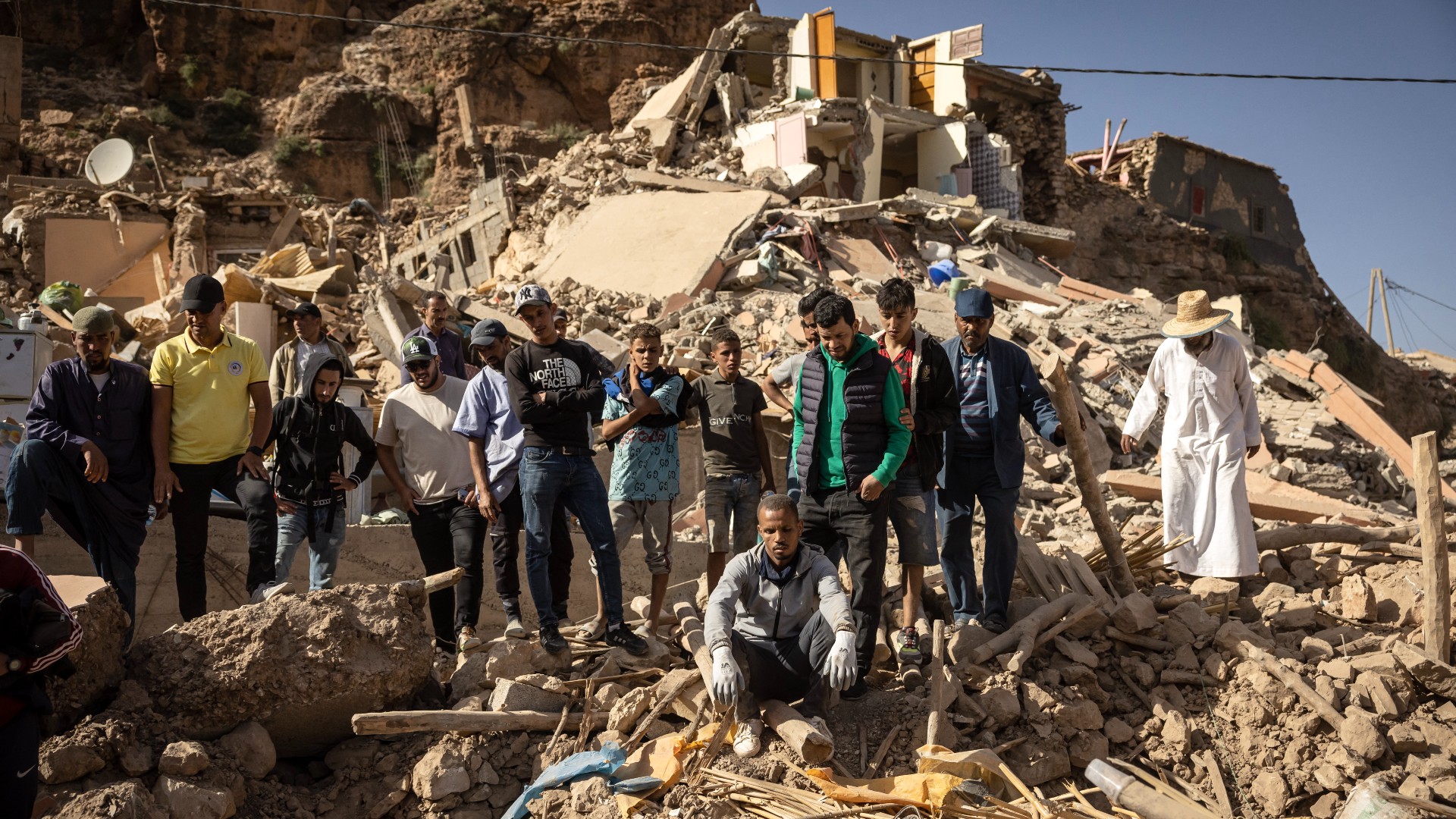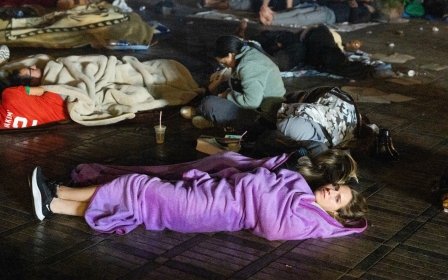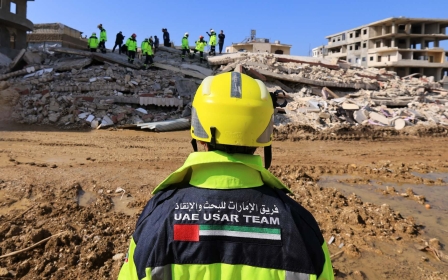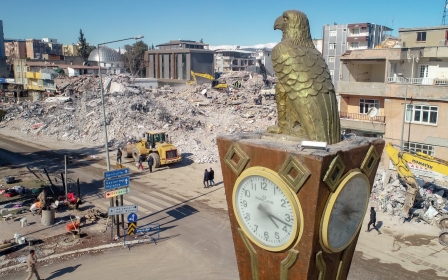Morocco earthquake live: Offers of aid flow in, but not without controversy
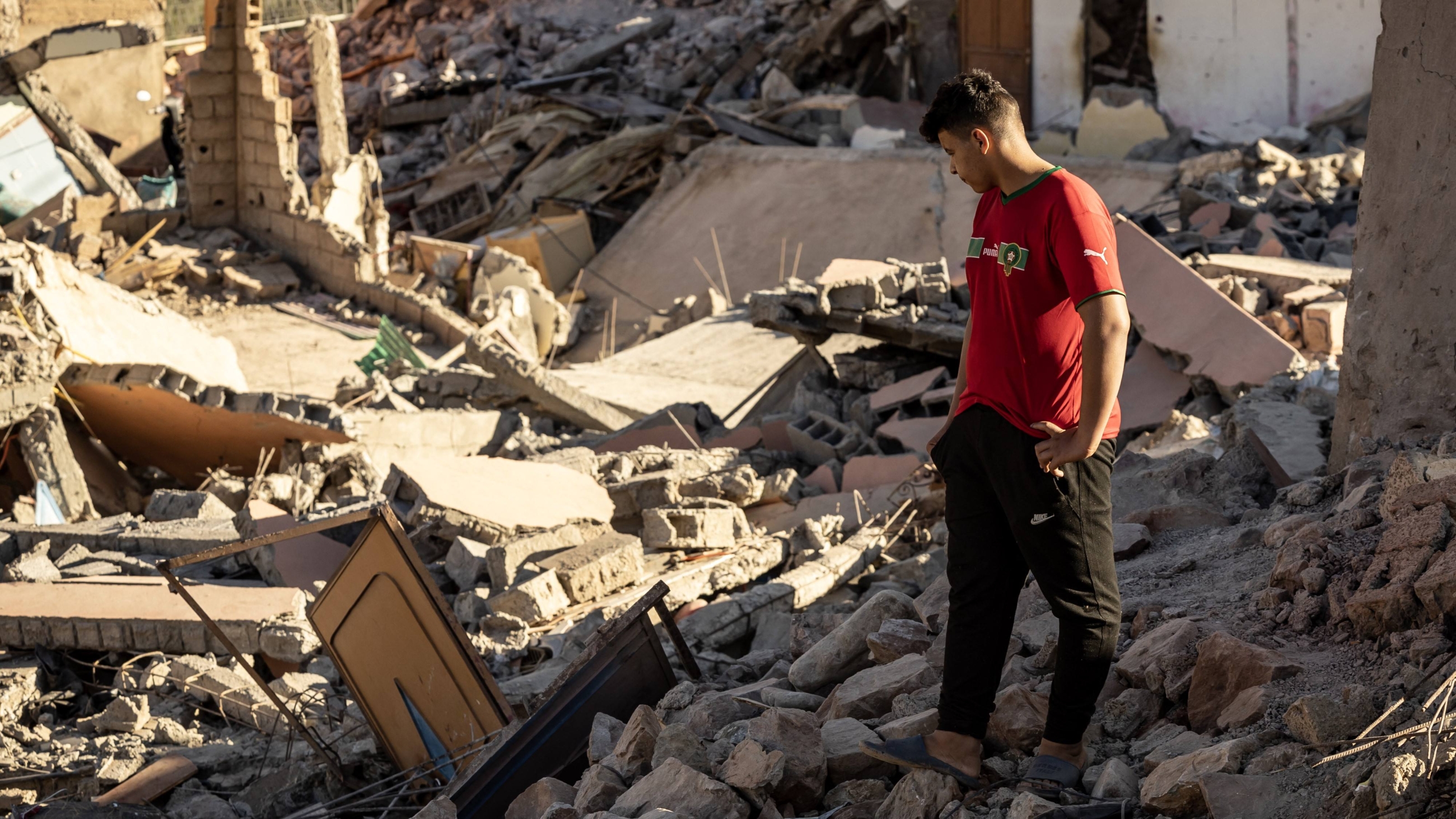
Live Updates
Good evening readers.
Several days after a 6.8 magnitude earthquake rattled Morocco, search and rescue operations continue as it reaches the end of the 72-hour period critical for finding survivors.
Rescue teams from Spain, the UK, and Qatar have now joined Moroccan operations on the ground.
The latest death toll from the quake has surpassed 2,800 lives, with thousands of others injured. Late on Monday, Algeria said it allocated three aircraft to transport a rescue team of 93 personnel as well as humanitarian aid to Morocco, awaiting the green light from the kingdom.
Both Algeria and Tunisia have long-established and well-regarded search and rescue teams and both countries have prepared those teams and made them available to Morocco.
But Rabat has hesitated to accept the offers of help from those countries, and its response to the earthquake is not being coordinated by the UN’s OCHA, which typically coordinates the international response to disasters.
The earthquake has particularly affected the indigenous Amazigh community of the Douars, the small villages sitting on the High Atlas Mountains.
With their homes being simple in design, they were left vulnerable and easy to crumble as soon as the earthquake struck.
Outside of Morocco, the diaspora community in the US has been hooked to their phones, watching on with a sense of helplessness as the death toll continues to rise. However, despite being separated by thousands of miles of oceans, Moroccans in the US have rushed to fundraise for relief efforts taking place in the country.
MEE is going to be taking a pause in coverage for the night, but if you want to stay updated on the latest news in the Middle East and North Africa, follow us on X, Facebook, Instagram and TikTok.
Algeria has allocated three aircraft to transport a rescue team of 93 personnel as well as humanitarian aid to Morocco after the devastating earthquake that hit the country on Friday, awaiting the green light from the kingdom, Algerian state news agency said on Monday.
Rabat has hesitated to accept the offers of help from both Algeria and Tunisia, which have long-established and well-regarded search and rescue teams and have prepared those teams and made them available to Morocco.
The death toll from the earthquake that hit Morocco over the weekend has now reached at least 2,862, according to state television.
State TV further reported 2,562 people being injured from the quake.
Moroccans in the United States are rapidly mobilising to send aid back home and help in relief efforts after large swathes of rural Morocco are in ruin, following the weekend's earthquake.
In the US, members of the Moroccan diaspora are hooked to their phones, watching helplessly as a drip feed of horror arrives with each passing hour.
With an estimated 128,000 Moroccans living in the US, everyone seems to know someone back home impacted by the earthquake.
"We wish we were there to help out physically," said Laila Mounia Alaoui, whose family back in Morocco survived the quake but had their home partially damaged, forcing them to sleep in the open since Friday evening.
"But what we can do [right now] is provide some material things to help - like tents and other basics," Alaoui told MEE.
Read more here.
'Wish we were there to help': Moroccans in US leap to assist earthquake relief
The death toll from Friday's earthquake has now risen to at least 2,681 people, according to Morocco's interior ministry.
The quake is the deadliest Morocco has seen since 1960, when an earthquake killed at least 12,000 people.
Both Algeria and Tunisia have long-established and well-regarded search and rescue teams and both countries have prepared those teams and made them available to Morocco.
Founded in 2004, the Algerian Heavy Urban Search And Rescue National Unit of Training and Intervention, which numbers 86 people, can be mobilised in two hours, has air transport and can keep itself equipped, fed and housed for 10 days, according to OCHA.
In Turkey and Syria, following the devastating earthquake there, locals praised the “really good” Algerians, who had “great equipment” and took “all the bodies out”.
Morocco has, however, so far not accepted the offers of help from Algeria and Tunisia, and its response to the earthquake is not being coordinated by the UN’s OCHA, which typically coordinates the international response to disasters.
For more detail, visit this Middle East Eye story on Morocco's reluctance to accept Tunisian and Algerian aid.
Morocco’s 6.8 magnitude earthquake which has killed over 2,500 people since Friday, has particularly affected residents of mud and clay houses among the indigenous Amazigh residents of the Douars, the small villages sitting on the High Atlas Mountains.
Rural communities, living traditional lifestyles have been some of the hardest hit, as their homes were simple in design, leaving them to easily crumble as soon as the earthquake struck.
The Amazigh people are an indigenous group from North Africa. Many live in Morocco’s Atlas and Rif regions. Find out more about them here.
The region along the Mediterranean Sea separating Africa from Europe is a tectonic hotspot, because it's the meeting place of the Eurasian and African plates.
It is no surprise, then, that northwest Africa and Iberia have suffered a number of devastating earthquakes over the centuries.
The 1755 Lisbon earthquake, which was immortalised in Voltaire's novel Candide, sparked destruction, tsunamis and fires that led to the death of at least 50,000 people in Iberia and 10,000 in Morocco.
More recently, the Al Hoceima earthquake, which was centred in the Rif Mountains, killed at least 600 people in February 2004.
For more detail, visit this Middle East Eye story on previous tectonic disasters affecting Morocco.
Morocco's northern neighbour, Spain, has been playing an important role in the response to the earthquake.
Spain has two enclaves bordering Morocco and is otherwise separated from the North African country by the Strait of Gibraltar.
Spanish rescue teams are on the ground, helping their Moroccan counterparts sift through rubble to try to get to those still alive after Friday's quake.
Earlier on Monday, Spain's embassy and other diplomatic outposts in Morocco observed a minute's silence for those killed.
While the two countries have traditionally disagreed over unauthorised migration, the status of Ceuta and Melilla (the two Spanish enclaves bordering Morocco) and the fate of Western Sahara, in February they agreed to set aside their differences and chart a new path forward.
Minuto de silencio hoy en memoria de las víctimas del terremoto 🇲🇦 en @EmbEspanaRabat 🇪🇦con sus Oficinas Sectoriales, Consulados Generales, I. Cervantes y Colegios Españoles pic.twitter.com/JusBbQ8CQ1
— EmbajadaEspañaMarruecos (@EmbEspanaRabat) September 11, 2023
International search and rescue teams deployed to Morocco after Friday's earthquake are not being coordinated through the UN's disaster response system.
A spokesperson for the UN's Office for the Coordination of Humanitarian Affairs (Ocha) told MEE that international teams arriving in Morocco were doing so without UN involvement.
While a UN Disaster Assessment and Coordination (Undac) team arrived in Morocco on Saturday to support UN humanitarian officials already in the country, search and rescue teams are operating independently.
Ocha typically plays a central organisational role in international responses to major disasters.
Morocco's state news agency says the number of people who have died in Friday night's earthquake has reached 2,497.
That death toll is expected to rise as rescuers make their way to villages that have been difficult to access until now, due to roads damaged by the tremor.
Teams from the UK, Spain and Qatar are already on the ground assisting Moroccan officials in search and recovery efforts, and several other states have offered to help.
A number of countries have sent messages of condolence alongside offers of aid, including the Israeli government, which normalised relations with Morocco in 2020.
Prime Minister Benjamin Netanyahu sent prayers for the wellbeing of those affected and instructed his government to "provide assistance as necessary to the Moroccan people, including planning to send an aid delegation to the area", according to his office.
For more reactions, read our full article here.
Morocco has accepted aid offers from Spain, the UK, Qatar and the United Arab Emirates, but offers from other countries, such as former colonial overlord France, have not been accepted yet.
There has been some controversy about why Rabat has not accepted French aid yet, and what the delay might mean.
The relationship between Paris and Rabat has been tense in recent years. Morocco wants France to recognise the contested Western Sahara as part of Morocco, which Paris has avoided doing.
In February, Morocco recalled its ambassador from France and has not filled the vacancy.
“This is a misplaced controversy,” France’s Foreign Minister Catherine Colonna said over the weekend when asked why the Moroccans had not accepted French aid.
King Mohammed VI of Morocco has thanked Spain, Qatar, the UK and the UAE for sending help in the wake of the devastating earthquake.
“We are ready to help Morocco. It’s a sovereign Moroccan decision and it’s up to them to decide,” said Colonna.
Moroccan authorities say they are assessing aid offers because "a lack of coordination could be counterproductive".
Age, mental wellbeing and physical health are just some of the factors that can help survivors overcome slim odds and survive for days under rubble.
It is generally accepted that the first 72 hours after a disaster are crucial, and are usually considered the golden phase of finding survivors.
More than 90 percent of earthquake survivors are rescued within the first three days, and there are several reasons for that.
Finding injured people before they lose consciousness, or succumb to their injuries and a lack of food or water, becomes of paramount importance.
Without water, in particular, many people can die in up to four or five days.
Most of the people rescued in recent days had not suffered life-threatening injuries during the earthquake, which allowed them to survive for a longer time.
The demographic of survivors also changes the more time passes - they tend to be younger.
The mental state of those trapped can also affect survival. People trapped next to dead bodies, who have no contact with other survivors or rescuers, may simply give up hope.
Videos of dust posted on X, formerly known as Twitter, surrounding the historic Kutubiyya mosque in the city of Marrakech have raised fears it could collapse.
A deadly earthquake in Morocco has damaged buildings in Marrakech's Old City and parts of its historic walls.
Parts of a minaret of a small mosque collapsed in the famous Jemaa el-Fnaa square, at the heart of Marrakech's Old City, causing injuries and damage to property nearby.
However, the famous Kutubiyya mosque, seen below, which overlooks Jemaa el-Fnaa, remained intact following the earthquake. But there are concerns about its structural integrity.


